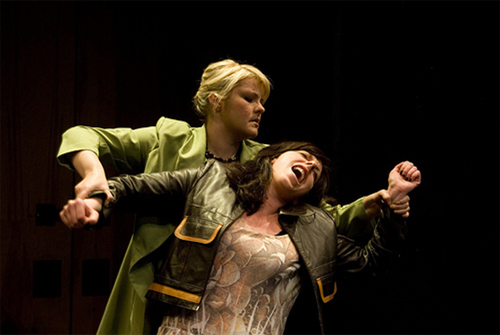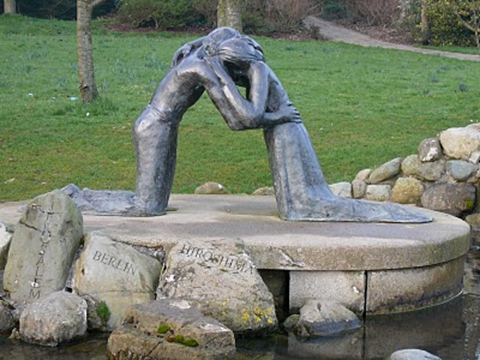DR STEFANIE LEHNER
Stefanie Lehner is currently a postdoctoral research fellow at the John Hume Institute for Global Irish Studies at University College Dublin, with affiliations to the School of Politics and the School of English, Drama and Film. Her research explores the performative dimensions of reconciliation in South African and Northern Irish cultural productions with regard to their impact on discursive constructions of individual, communal, and national identity. Considering in what ways, and to what extent, the South African experience is used a template for Northern Ireland, the key concern is to examine how conceptions of the individual and society are reworked and reshaped by the institutional changes involved in conflict resolution in both societies, and how these are reflected and debated in theatre performances as well as literary and visual ‘texts’.

Tara Lynne O'Neill and Claire Lamont in Everything Between Us by David Ireland. Photography Chris Pifer. Co-Produced by TINDERBOX THEATRE CO & SOLAS NUA.
Research Aims and Objectives:
- To further develop existing approaches to the interactions between political and cultural discourses and practices within the framework of post-conflict situations.
- To review and establish the ways and the extent to which contemporary cultural productions engage with theories and practices of reconciliation in the context of Northern Ireland and South Africa, and thereby reflect or debate popular attitudes, values and identifications with them.
- To determine and analyse the performative dimensions of reconciliation and their theoretical and practical implications for constructions of (individual and communal) identity.
- To consider the importance of class, gender, sexuality, ethnicity, and religion in relation to popular, political, cultural, and theoretical perspectives on conflict resolution and practices of reconciliation.
- To assess the extent to which art is able to envision new and alternative forms of ethno-national identities and transpersonal relationships, and thereby offer a ‘restorative aesthethics’.
This project comprises a significant contribution to the emerging body of research on the interrelations between law and literature, and between ethics, politics and aesthetics. This work will develop existing research in these areas with specific focus to the Northern Irish and South African context. As the first of its kind, this study thereby offers an innovative approach to understanding the performative qualities of conflict resolution in the Northern Irish peace process from an interdisciplinary and comparative point of view. At a time when questions of how to resolve political conflict and deal with the violence and human violations of the past are debated worldwide, the significance of this project goes far beyond its immediate context.

Reconciliation by Josefina de Vasconcellos (originally created in 1977 and entitled Reunion). Stormont Estate, Belfast.
Stefanie completed her PhD at the University of Edinburgh in 2008, which outlines an Irish-Scottish comparative framework for exploring the shared concerns and noteworthy differences that constitute and characterise a significant of the Irish and Scottish literary scene since the 1980s. This work reassesses the relevance of postcolonial criticism for reading contemporary Scottish, Northern Irish, and Irish fiction. Stefanie has widely disseminated her research: she has spoken at several conferences and published in the areas of both Scottish and Irish studies. A revised version of her thesis is to be published as a monograph by Palgrave Macmillan in 2010 under the title Tracing Subaltern Counter-Histories in Contemporary Scottish, Irish and Northern Irish Literature. Stefanie has taught English, Scottish and Irish Literature at Edinburgh, and worked as a tutor for the Scottish Universities’ International Summer School (SUISS).
Principal publications
Monographs
- Tracing Subaltern Counter-Histories in Contemporary Scottish and Irish Literature. Basingstoke: Palgrave Macmillan (forthcoming 2010).
Journal Articles
- ‘Filiative Futures?: The Politics of Reconciliation in Contemporary Northern Irish Drama.’ In Preparation.
- ‘Reconciled Masculinities?: The Gender Politics & Performances of Post-Conflict Cultural Productions.’ In Preparation.
- ‘The Peace Process As Arkhe-Taintment? Glenn Patterson's That Which Was and Eoin McNamee's The Ultras’ (Winner of the 2007 BAIS Essay Prize). Irish Studies Review 15.4. (2007): 507-520.
- ‘Towards a subaltern aesthetics: James Kelman and Robert McLiam Wilson's Rewriting of National Paradigms’. Esharp: Electronic Social Sciences, Humanities and Arts Review for Post-graduates Issue 5 (2005): <http://www.sharp.arts.gla.ac.uk/issue5.php>.
Essays in Edited Collections
- ‘(Post)Colonial Trauma – Postmodern Recovery? Gender, Nation and Trauma in Contemporary Irish and Scottish fiction’. In Voicing Dissent: New Voices in Irish Criticism, eds. Noreen Doody and Sandrine Brisset (forthcoming 2009)
- ‘‘“Un-remembering History”: Traumatic Herstories from Contemporary Ireland. Jennifer Johnston’s The Invisible Worm and Roddy Doyle’s The Woman Who Walked into Doors’. In New Voices in Irish Studies: Essays on History and Literature, ed. Brian Griffin. Bath: Bath Spa University Press, 2009.
- ‘Subaltern Scotland: Devolution and Postcoloniality’. In The Edinburgh Companion to Contemporary Scottish Literature, ed. Berthold Schoene. Edinburgh: Edinburgh University Press, 2007. Pp. 292-300.
- ‘Subaltern Counter-Histories in the Scottish-Irish Archipelago: Ethics and the Burden of History in James Kelman, Patrick McCabe and Glenn Patterson’. In A Further Shore: Essays in Irish and Scottish Studies, eds. E. Agnew, E. Hughes, C. Magennis and C. Morin. Aberdeen: Centre for Irish and Scottish Studies, 2008. Pp. 147-157.
- ‘Reassessing Postcolonial Criticism for (Northern) Ireland and Scotland: Rewriting National Paradigms’. In Beyond the Anchoring Grounds: More Cross-currents in Irish and Scottish Studies, eds. S. Alcobia-Murphy, J. Archbold, J. Gibney and C. Jones. Belfast: Cló Ollscoil na Banríona, 2005. Pp. 154-162.
Contact Details
Email: stefanie.lehner@ucd.ie
UCD John Hume Institute for Global Irish Studies
University College Dublin
Belfield
Dublin 4
Ireland
- Dr Thomas Kador
- Dr Ciaran O'Scea
- Dr Catherine Morris
- Dr Siobhan Byrne
- Dr Neil Fleming
- Dr Jim MacPherson
- Dr Laura McAtackney
- Dr Stefanie Lehner
- Dr Susan Cahill
- Dr John O'Neill



